“Frame of Mind”
Written by Brannon Braga
Directed by James L. Conway
Season 6, Episode 21
Production episode 40276-247
Original air date: May 3, 1993
Stardate: 46778.1
Captain’s log: We open on an extreme closeup of a very messed-up-looking Riker, who is acting in one of Crusher’s plays, called Frame of Mind, alongside Data. It’s a pretty intense back-and-forth, with Data perfectly cast as the even-toned doctor who quite reasonably suggests that he’s still a dangerous psychopath, and Riker just on the edge of going completely binky-bonkers. At one point, Riker loses his way in a speech, and he breaks into a smile. Crusher says it’s okay and calls it a night, as things are going well. Riker heads back to his quarters, going over the speech, and getting strange looks from the people he passes in the corridor. En route, he bumps into a science officer he doesn’t recognize.
The next morning, he meets with Picard. The Enterprise is heading to Tilonus IV, where the prime minister has been assassinated and numerous factions are vying for power. Riker’s mission is to locate and rescue the Federation research team that’s on the planet. He’ll have to go undercover and alone, and he’ll also have to back out of being in Frame of Mind—but Picard assures him that they won’t arrive at Tilonus for five days, so he can still be in the play. Besides, Picard says gravely, if he backs out, Crusher will nab Picard for the part, and the captain makes it abundantly clear that that ain’t happenin’…
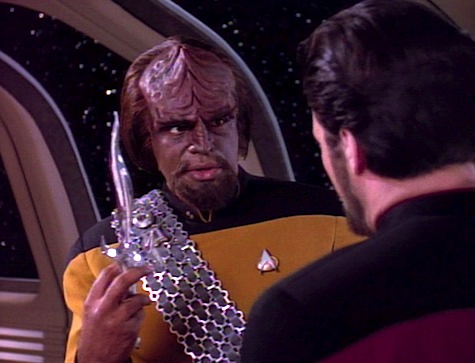
Worf gives Riker a briefing on the mission. Riker is flippant, perhaps more so than usual, and Worf is particularly uninterested in responding to Riker’s lame jokes, definitely more so than usual. Riker will be disguised as a merchant, and will have a necklace with a communicator circuit inside it. He will also have to know how to wield a dagger for the traditional bartering ceremony. While demonstrating, Worf accidentally cuts Riker right at the temple. The first officer goes to sickbay, where Crusher treats the cut—but he still feels pain. There’s no nerve damage, and he fobs it off as stage fright. As he’s about to go, La Forge brings in an engineer who had a plasma torch blow up on him. Even as Crusher treats him, the engineer stares at Riker with an accusatory look on his face.
Riker immediately goes to Troi to tell her what’s been happening—that engineer’s just the latest, he’s felt like people have been staring at him and talking about him ever since he started rehearsals for Frame of Mind. Troi figures it’s him really getting into the role, and embracing his dark side. Then his temple starts to ache again, and he sees the same science officer he saw in the turbolift.
We cut to opening night. Riker absolutely nails the speech he struggled with earlier. Data and Riker take their curtain calls, Riker gets a standing ovation. Then the science officer appears again between Worf and Picard, studiously not clapping. After taking another bow, Riker straightens—and the audience is gone. He’s in a real version of the cell that was a stage set a moment ago, and instead of Data, there’s someone else from the same species as the science officer in the doctor’s uniform that Data had worn, and he uses Data’s last line from the play that they still have a lot of work to do.
According to the doctor, who identifies himself as Dr. Cyrus, Riker is a patient who suffers delusions that he’s an officer on a starship. But, according to Cyrus, there is nobody who fits his description in Starfleet—they checked with Admiral Boudreau on Starbase 29—and his headache is from when he hit his head during an escape attempt. Cyrus explains his remembering it as being cut by a Klingon as transposition, shifting elements from reality into a fantasy. Cyrus is encouraged, as there was a time when he couldn’t break away from his starship fantasy at all.
Riker asks where he is and why he’s there. He’s in Ward 47 of the Tilonus Institute for Mental Disorders, but Cyrus won’t answer the second question. After he leaves, Riker checks the cell, and looks at himself in the mirror. A disembodied voice then offers him time in the common area. An orderly comes in to lead him there, accompanied by an armed guard. When Riker insists the weapon isn’t necessarily, the orderly laughs and says, “That’s what you said last time.”
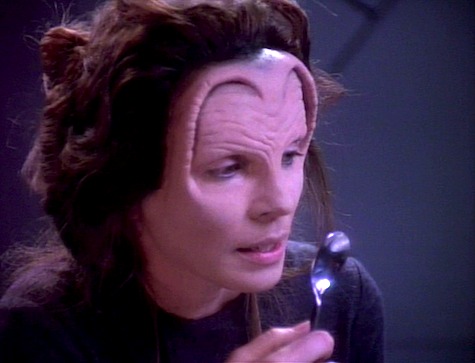
He’s brought out to a big room where folks are sitting, playing with objects, sculpting, and more. He sits down, and a woman sits with him, saying that she’s Commander Bloom from the Yorktown, and that several other inmates are officers as well. She’s fashioned a communicator—which turns out to be a spoon, which she speaks into the head of to contact the Yorktown. The orderly, whose name is Mayvec, chases the woman off. Her real name is Jaya. Mayvec also provides the answers Cyrus didn’t: Riker was found covered in blood holding a knife standing over a mutilated body. Riker insists he didn’t kill anyone, and attacks Mayvec, who then gives him an injection—
—and he wakes up in his bed on the Enterprise. It’s the morning of opening night. As he’s getting ready for the play, he tells Crusher about his nightmare. As he and Data perform the closing bit, Riker sees Mayvec on the other side of the door, hears strange noises, and almost blows the part. Then he sees the science officer in the audience and grabs him, asking who he is. The frightened officer says he’s Lieutenant Suna. Riker lets go, abashed, and Crusher takes him to sickbay. She finds no evidence of neurological problems that would cause hallucinations, though he is physically exhausted.
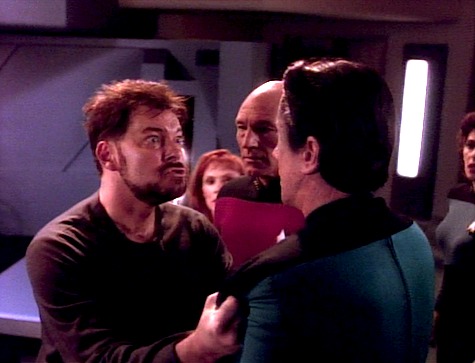
Troi walks him back to his quarters. (En route, Data congratulates him on his “improvisation,” which he claims helped draw the audience into his character’s plight, which is as good a rationalization for his almost assaulting a crew member as any.) He also hears Cyrus’s voice saying he needs another treatment, but tells Troi nothing’s wrong. He goes into the turbolift, and when the doors open to his deck, it’s a corridor in the institute—at first. Then it’s deck eight, like it should be.
But when he turns a corner, he sees Jaya. He runs to his quarters, but as soon as the doors close, he’s back in his cell in the institute.
He talks to Cyrus—when he’s on the ship, nothing makes sense, but when he’s back in the institute, everything feels real. But he still doesn’t remember the murder he’s accused of. Unfortunately, the hospital administrator is under pressure to resolve his case and give his cell to someone else who needs help. Cyrus suggests reflection therapy, which probes his emotions and projects them holographically so he can interact with them. The alternative is, in essence, a lobotomy. Riker picks door #1 for obvious reasons.
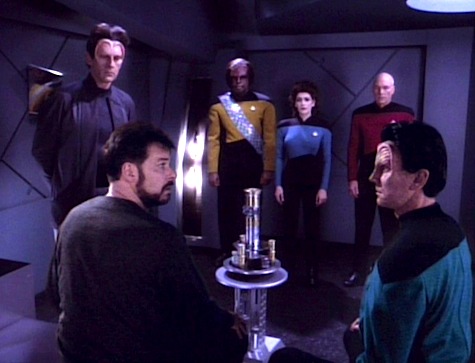
Cyrus tells him to think of how he felt when he first came to the institute. He felt fear—at which point the device projects a hologram of Troi. She represents his fear, and the hologram describes how he felt trapped. When he accesses that emotional memory, Worf appears, stating that he was angry. They go back and forth, Troi as his fear, Worf his anger—and then Picard appears, describing the more objective reality of what happened, while Troi and Worf continue to express his emotional state during those events.
Then Suna is projected—in his Starfleet uniform. Cyrus is confused, as Suna is the hospital administrator, whom Riker only met once, when he was admitted. The holographic Troi, Picard, and Worf all step forward and tell Riker not to believe it, that none of it is real, that he’s still with them on the Enterprise. Riker denies this, denies them, and the holograms all fade. Cyrus is pleased—this was a big step for him, finally turning his back on the delusions.
Later, Riker sits in the common area, eating. Crusher then walks in, wearing civilian garb. She sits across from him. Riker insists she’s not real, trying hard to ignore her. Figuring he can’t talk to her, she just tells him to listen: he was undercover on Tilonus IV, something went wrong, and he was put in this institute. The hospital administrator refuses to admit that he’s there, and the Enterprise is being blocked at every turn. Crusher is posing as a Federation health official to gain access to the institute, and she says they’ll get Riker out of there. But Riker is at this point completely convinced that it’s all fake and that Crusher is just another delusion.
That night, Data and Worf, dressed in black, try to rescue Riker, but he refuses to go, resisting rescue and even grabbing Worf’s phaser and running behind the protection of the institute’s security. However, Data and Worf make short work of Mayvec and the guard and they take Riker and beam him back to the Enterprise with the help of a pattern enhancer. (Which only makes sense—a mental institution would have to be transporter proof.)
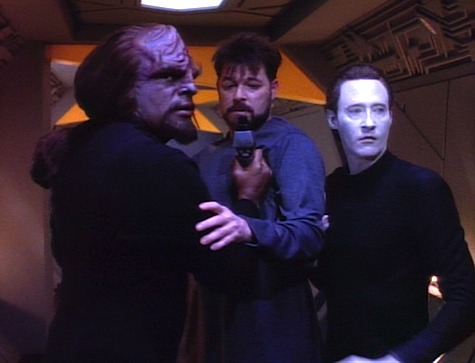
Crusher examines him and discovers damage to his parietal lobe and he’s in a state of shock. Recovery will take a while—as if to prove it, he flinches when Picard tries to touch his shoulder. His temple still hurts—and there’s a cut that’s still bleeding, where Worf supposedly cut him. Worf and Picard explain that Suna is involved with one of the rival factions on Tilonus.
Then Riker’s temple starts to bleed again, after Crusher has healed it twice, and he’s now convinced this isn’t real. He knocks Worf down and again takes his phaser, eventually turning it on himself—at which point reality shatters and he’s back in his cell, with Suna asking Cyrus and Mayvec for a report on how he’s progressing, and then reluctantly admits that the lobotomy is the best option. Riker, though, is still holding a phaser, which doesn’t make sense (Suna insists it’s a knife he stole from the common area). Then his temple starts to bleed yet again.
He fires his phaser on Mayvec, who then shatters (not the usual disintegration pattern, but actual shattering). Riker knows none of this—the institute, the Enterprise—is real. He fires it again—and the cell shatters, revealing the Enterprise theatre. Riker and Suna are onstage, with Picard, Worf, Troi, Crusher, and other crew members in the audience.
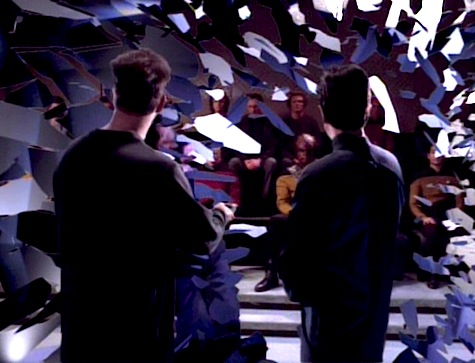
Riker realizes that Suna is the key. He’s the only person who’s been in both places. Suna says Riker can be saved if he stops fighting them. His temple starts to bleed yet again, at which point Suna says, “Let me help you,” and Riker responds with a screaming, “No!”
In response, the audience applauds. He pushes Suna and screams, “No!” again, and the audience response grows louder, turning into a standing ovation. Then Riker himself shatters—
—and he’s lying on a biobed of some kind, a lead attached to his temple (right where it was bleeding). Suna and the security guard are operating a console, and Suna complains that he’s conscious. The guard moves to sedate him, but Riker palm-heels him in the face and then grabs his personal effects, which are on a table: the necklace communicator and the merchant dagger. He grabs them both, using the former to contact the Enterprise while using the latter to hold Suna at bay. He calls for emergency transport.
He was kidnapped while on his undercover mission to Tilonus. Suna was trying to extract information using a neurosomatic technique. Riker’s unconscious used bits of recent memory—the mission prep, Frame of Mind—to resist what Suna was doing, keeping him grounded and sane, ironically by making him think he was insane. (There is never, at any point, any word about the Federation team Riker was supposed to rescue.)
Riker then goes to the theatre and asks Crusher to strike the set alone. He needs the catharsis.
Thank you, Counselor Obvious: When Riker has his pre-opening-night jitters, Troi goes and quotes Jung and stuff. During the reflection therapy, the image of Troi represents Riker’s fear and panic.
If I only had a brain…: Data is able to use contractions as the character of the doctor. Nobody comments on this.
There is no honor in being pummeled: Worf accidentally cuts Riker during the mission briefing, then later has his phaser taken from him by Riker, not once, but twice. Luckily, none of that really happened. In the reflection therapy, Worf represents Riker’s anger and apprehension.
I believe I said that: “You’ve told me what to eat, and what to think, and what to say, and then when I show a glimmer of independent thought, you strap me down! You inject me with drugs, you call it a ’treatment’!”
“You’re becoming agitated.”
“You bet I’m agitated!”
Riker and Data as the patient and doctor in Frame of Mind, with Data using contractions.
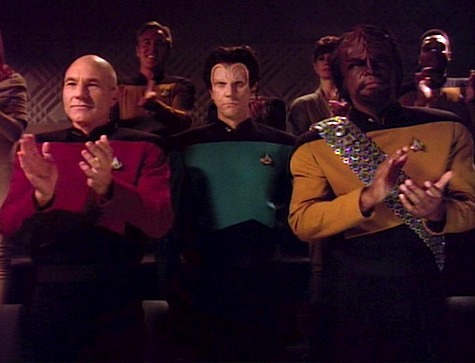
Welcome aboard: Two returning guest stars in David Selburg as Cyrus—he last played Whelan in “The Big Goodbye,” and will play roles on both Voyager and Enterprise—and Susanna Thompson as Jaya—last seen as a Romulan in “The Next Phase,” she’ll be back as the Borg Queen on Voyager and Lenara Kahn on Deep Space Nine. Also of note is Allan Dean Moore as the wounded engineer, who packs a lot into a single accusatory facial expression directed at Riker.
Trivial matters: Writer Brannon Braga cited the Roman Polanski film Repulsion as an influence on the episode. He also specifically wanted to focus on Riker due to the character being underused of late.
This is James L. Conway’s first time directing TNG since the first season (he directed “Justice” and “The Neutral Zone”), and he would go on to direct seven DS9 episodes as well as four each of Voyager and Enterprise.
This is the second time Riker has gone undercover on a planet and gotten captured, after “First Contact.”
Make it so. “Maybe you need another treatment.” This is a glorious little mindfrell of an episode. We know, since we’re in the sixth season of a TV show, that Riker hasn’t really been imagining being on the Enterprise (though there’s an amusing conceit to the notion that Riker is Tommy Westphall from St. Elsewhere), so the stuff on Tilonius has to be fake. But it’s equally obvious—and becomes more so as the episode progresses—that what’s happening on the Enterprise is wrong somehow, also.
It’s interesting, watching this again, I realized how much this calls back, not only to “First Contact” (Riker going undercover and getting trapped in a hospital), but also to “Schisms” (Riker totally losing it, with hallucinations and stuff, and having it all turn out to be him being kidnapped by aliens), but “Frame of Mind” actually works better than either of those episodes, in part because we’re immersed in Riker’s delusion from the get-go. In fact, only the last three scenes in the episode really happened—the entire rest of the story is a product of Riker’s subconscious fighting against Suna’s attempt to get at his memories.
Riker’s struggle plays out in the conflict between the two realities he’s encountering, with neither being real, but with evidence that each is real, which is enough to keep him questioning, to keep him resisting both the institute and the Enterprise, eventually getting him to reject it all and come out of it.
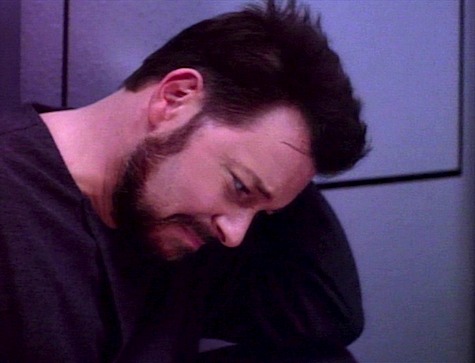
What sells it is all the little set pieces: the play Frame of Mind, Riker’s worry that he’s losing himself in the part of a crazy person, the other inmates, the character of Cyrus who seems to be genuinely interested in helping Riker, Worf and Data’s rescue, and so on. In particular, I love the way the reflection therapy scene played out, the memories of the attack (which is something that did actually happen, as we find out in the end) being recited by Picard, Worf, and Troi, ping-ponging from one to the other depending on what emotion is being accessed. (I only question the use of Picard there, which may have been done to give the show’s top-billed star an additional scene—since that avatar gave a more objective reading of the events, it would’ve made much more sense to use Data for that.) Braga writes a tight, impressive story here, and Conway does an excellent job, all the way to the surreal visuals of the shattering realities as both delusions start to break down.
But all the good writing and directing in the world won’t help if the actors can’t carry it, and Jonathan Frakes deserves a ton of credit for his work here. Riker is often at his best when he’s either completely relaxed or being horribly abused, and he shines in the latter here. Just a bravura performance. What a pity that the Emmy voters refused to acknowledge the existence of actors in genre productions twenty years ago, as in a just world (or in the current one), Frakes would’ve gotten some Emmy consideration for this.
Warp factor rating: 9
Keith R.A. DeCandido is going to be at Flora in Arlington, Massachusetts on Tuesday the 11th of December at 6pm for the east coast launch of Tales from the House Band Volume 2, an anthology from Plus One Press that includes his story “I Believe I’m Sinkin’ Down.” He’ll be joined by fellow contributors Clea Simon, Brett Milano, and Dave Brigham. Come check it out!










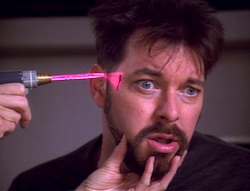
My first reaction when I realized what episode this is was “Riker gets tortured again.” But is that a false impression? Does he really get dumped on more than the other main characters?
I saw this after I saw the Buffy episode where something similar happened to her, and I really enjoyed both of them. I liked the way things from one “world” would bleed into the other and, well, it sounds silly to say that he shot himself out of his insanity, but it worked, didn’t it?
My memory of this episode is “the one where Riker Hairstyle #2 is used a lot.”
That said, it really is a well put-together ep. Lot of torture going on this season…was that a big topic then?
I really loved this episode – it was just totally different and unexpected and ‘atmospheric’. It was kind of like a horror movie/thriller, especially as it plays on a pretty big fear of not knowing what is real or doubting your sanity. Maybe if you thought about it too long it would fall apart, but I definitely enjoyed it.
I also wanted to see Data represent ‘logic’ as well, but ah well :) My husband suggested that perhaps he is more meant to be a blend of logic AND emotion (a more integrated aspect of his personality).
Ah, Frame of Mind, how I love thee. And how I love that opening scene between Riker and Data as Patient and Doctor which won me many a theatre competition in my youth…
I really wish that Braga had gotten on board with Behr when he was doing his in-universe books and decided to write a One Act version of Beverly’s play. It’d be interesting. Reminded me of Pinter’s “One for the Road”.
All in all though, great episode. So fun to see how theatre shakes itself out and is still viable in the 24th century. Thankfully the Holodeck didn’t kill it…
Riker doesn’t get tortured; Riker gets put into situations that lead him to question his own identity and/or sanity. O’Brien’s the one that gets flat-out tortured.
Many dramatic TV series, usually somewhere around the fifth season, do an episode where some character wakes up to discover that they’re in a mental hospital and everything they’ve done is an elaborate delusion. We’ll call the story and circumstances they “thought” they were in “A”, and the story where they’re in insane and in a hospital “B”. This has been happening since the finale of “St. Elsewhere” implied that the entire show happened in some kid’s imagination.
This doesn’t work very well. Unless the show completely sucks (in which case it probably won’t last five seasons), the audience has way too much investment in the internal reality of the world to believe for a minute that the Enterprise is all in Will Riker’s head or what have you. The series isn’t ending, and we’re reasonably sure that it’s not doing a radical genre shift into One Flew Over The Cuckoo’s Nest with bumpy foreheads*, so we all know that it’s not all in their head and in the next episode they’ll push the reset button.
As a result, an episode like this stands or falls on whether the “B” story is somehow interesting to watch. In DS9, it was mostly about racism and the possibility of imagining a better future. In Buffy, it was about the aftereffects of her resurrection, which was at least good character development, though I think the point had been made by then. In this episode it was about Riker’s frantic search for the reset button. We didn’t learn anything about him, any of the other characters, the supposed mission he was on, human nature, or anything else. It earns a big fat “meh”.
Jonathan Frakes’ performance as Crazy Guy was really the only thing this episode had going for it. That, and the “shattering” effect looked cool.
* Though that would have been awesome with, say, Voyager. They’d be in the middle of an episode about Harry Kim going through puberty or the holodeck eating children and then Seven of Nine would wake up and find that she’d never been separated from the Borg–it was simulated as part of a research project in the collective. They’d thank her for her service and move her to the Relaxation Program, where she’d sit in hot tubs and get massages and Kaylee from Firefly would feed her strawberries, and that would go on until we got tired of watching it, which would be approximately never.
Wouldn’t that be Troi? Who is brain candy for every sadistic telepath/empath/mind weasel this side of Vulcan.
This is arguably Brannon Braga’s best script, the pinnacle of the surreal, reality-bending, Twilight Zone-y stuff he reveled in. Sure, we know which reality is real, but as Keith said, the Enterprise stuff is clearly off too, so the thing that makes the episode compelling (at least the first time through) is the mystery of just what the hell is going on and the cleverness with which the nested unrealities play out, as well as the mood the episode successfully creates, the pervasive sense of disorientation and paranoia. And yes, the visual of reality literally shattering around Riker was very impressive and innovative at the time.
I really should watch this one again. Truth be told, I tend to avoid it because it actually kind of creeps me out. That’s a testimony to how well it was done, of course. Just…don’t watch it before bed. Trust me.
@6,
You beat me to it. O’Brien Must Suffer!!
To be fair, that really was a DS9 thing. I don’t view TNG as having done that much torture – and I don’t consider Frame of Mind torture per se, as it was Riker’s own mind doing the trick. Only major TNG torture eps I can think of are Schisms, and of course the fantastic Chain of Command Part II.
Edit: ok there was that awful Troi episode with the guy whose mind-eff made Troi age overnight. But even calling that one an episode is too polite.
This is one of the few episodes I remember really well from my childhood. I was 9 years old when this aired, my youngest sister had just been born (thwarting all my plans at being the only daughter) and I remember going into school the next day and annoucing to my classmates that this entire world was a delusion of my mind and thus I would shatter this reality to get back to the real one.
…you can imagine how THAT went.
I love the first photo. Screen cap faces really make me laugh sometimes.
WAIT A SECOND! Now I just noticed…the place where the cut is on his head is approximately the same place he has the straw coming out in “Phantasms”…
Anyway, I get to thinking about two Stargate episodes that resemble this one: The one where Teal’c has to pass his symbiote back and forth with Bra’tac, and his mind experiences a fictional creation of his real life with SG-1, and a totally fictional creation in which he’s someone else; The Atlantis episode where Doctor Weir has the nanites and thinks she’s in a mental hospital where everyone is trying to convince her that her life on Atlantis was a delusion. But as someone pointed out, this formula has appeared on other shows and before this one, so I really just start thinking about “The Simpsons Did It” now and how no show has an original idea.
@5: “So fun to see how theatre shakes itself out and is still viable in the 24th century. Thankfully the Holodeck didn’t kill it…”
This is interesting…it’s presumably like how holonovels did not kill regular novels (though, it seems people are only ever reading old books, so are there new novels coming out in book form?). Or, in our own world, how television did not kill theater or books (but it did kill the radio star). I just saw one of the Voyager episodes where they go back in time and Neelix and Kes are fascinated by 2D tv, so it seems that the holodeck maybe did kill tv.
Mark Z – I think the best part of these episodes is watching the actor play the crazy person.
And crzydroid – thank you for reminding me about Dr. Weir, I’d totally forgotten about that one!
Rating 9/10? Seriously? For a mystery episode that ends “it was all a dream in one character’s head” and a premise that wouldn’t have happened if they had just gone with subcutaneous trackers, you know, after the last time Riker was on a covert mission and got trapped in a hospital?
Good thing this time these people, who were some kind of intelligence squad, kept his working communicator loose on a table in the room he was in. It’s the climax of the episode and I laughed when Riker pressed it and Wolf replied “Enterprise here” like some telephone operator and Riker had to tell him he wanted to be beamed up.
This episode was creepy, especially in the beginning, there was some good acting, and I agree the shattering effect was nice looking, but the ending.
@@@@@ Krad
As a former theatrical professional I thank you for using the word strike for the dismanteling of the set. In my dozen and some years in the industry when I’ve used the term around non theatre folk I generally get a response along the lines of “well isn’t that an extreme reaction to ending a show?”. So thank you for using it, and using it correctly.
I wholeheartedly agree with Schwartz. I was glad you used the correct term.
A fine episode. However, imho it misses the point of what TNG is about. You know, on a mission to find out new stuff.
‘No!’
Clapping.
‘No!’
Strenuous clapping.
‘No!’
Standing ovation.
Push at screen – crash, bang, wallop – mesmerising viewing, just fabulous.
Jonathan Frakes’ finest moment – a really subtle performance. Did anyone else notice how he gradually starts to overplay as the episode goes on?
(No jokes, please…)
One thing I’m surprised that no one has mentioned is the subtle fact that there were no establishing shots of the Enterprise until the very end of the episode, once we’re back to the true reality. A very minor trick that, when noticed, shows where the line between fantasy and reality changed.
It’s funny. You mentioned the similarities to “Schisms” and I think of this episode when I see that episode title. So much so that I was dreading when the rewatch came to that episode. Then when I saw this was the next episode on my Netflix queue I had to make myself watch it instead of skipping over it. I don’t think I’ve seen it from start to finish since the original broadcast, because for some reason my late teenaged self absolutely loathed it. I had it in my head as getting a 3 at best, more likely a 2.
I couldn’t have been more wrong. Maybe the intervening years, and a couple times questioning my own sanity, have given me a better understanding of just how well Frakes pulls this off. I do agree that Data would have been a more… logical choice in the reflection therapy scene. I have to admit that by the end, I never wondered what happened to the team he went after, so I suppose I can forgive the writers for doing so, too.
The moment I shook my head at was Suna’s reaction after Riker is beamed away at the end. He just sort of gives a half-hearted punch to the the table or bed or something and looks like he’s got heartburn. Seems like he just had a major effort ruined. You think he’d be more upset.
@13: TNG’s “The Neutral Zone” established that television ceased to exist as a form of popular entertainment sometime in the 2040s. Presumably it was replaced by online media, which is an increasingly credible prediction.
@15: No, the ending wasn’t “It was all a dream.” We could tell much earlier that what Riker was experiencing wasn’t reality, and the mystery was what was causing his delusions and which reality, if either, was real. It was like a Philip K. Dick story where you’re left unsure whether anything you’re seeing is provably real. The unreality isn’t a sudden reveal in the final minutes, but the driving concept behind the whole thing, the systematic erosion of the characters’ and viewers’ certainty about everything they experience. That’s what a “mindfrell” story is all about.
I think this is one of the best episodes ever. I’m willing to accept the few plausibility flaws for the drama (and the acting!) on display here.
Rembember that Twilight Zone episode The After Hours, where a woman finds out her entuire life, her entire sense of reality, can be stripped bare by a simple wrong turn in a department store?
I see this as the Trek equivalent of that. Not in execution so much as in exploration of similar elements.
How secure are we in our lives, in what we know to be true?
Powerful episode all around.
Mental institution episodes freak me out. Frakes does a good job of I’m not crazy/crazy guy. On another note why do they keep letting Riker go on away missions by himself he gets captured EVERY time. Why isn’t he wearing a tracker when he leaves the ship?
Just so folks know, some real life stuff has intruded, so the rewatch of “Suspicions” will have to wait until Wednesday.
—Keith R.A. DeCandido
But are you sure it’s real? Ha ha ha.
Hope everything is okay!
Yeah, everything’s fine, thanks for asking, it’s just too much other stuff going on for me to squeeze the Rewatch in….
—Keith R.A. DeCandido
I think krad is holed up watching the Season 2 blu-ray released today :).
That’s okay, I like having the Tor goodness spread out throughout the week! The other two recurring blogs I follow/am addicted to also come out on either Tuesday or Friday, so during the rest of the week I have nothing to do but stalk comment threads (or read some of the other articles but it’s not the same, sigh).
I mean, uh, work. I have nothing to do but work ;)
I’ve never been particularly fond of this episode but it always resonates with me on a personal level. In February of 1993 I was a young Trekkie visiting family in L.A. and I made a pilgrimmage to the Paramount lot in hopes of catching a glimpse of “TNG” – the sets, an actor – something. There were no tours but I managed to sneak on to the lot. (Not through the famous main gates but through the far less secure Gower Street entrance on the side.) I carried a clipboard and mostly walked purposefully in the hope that I’d look like someone who was supposed to be there. After circling the lot a few times (the coolest part for me were the city streets I recognized from “The Untouchables” and countless other productions) I took a stab at entering Stage 8 through yet another side door. Out of nowhere I was spotted by some guy with a headset. I bluffed and pretended to be lost and looking for David Livingston’s office (a name I only knew from show credits!) and he sent me on my way. I was too freaked to try entering the building again so I kept walking near the trailers with the slim hope of seeing a cast member. I was just about to give up when I saw none other than Jonathon Frakes. He had just gone to his trailer and was upset about something. I don’t remember what he said but he looked like he was about to tear some poor P.A. a new one. He shot me an angry look and stormed off. Given his apparent mood and my own status as a trespasser it seemed unwise to say anything to him but I was curious why he wasn’t wearing his Starfleet uniform costume but instead was dressed completely in a kind of black informal tunic. I left the lot shortly after and would never have known what episode he was shooting until “Frame of Mind” aired three months later and I saw that he spent most of the show in the same black tunic I had seen that day. In retrospect I’m damned lucky I wasn’t arrested but it was thrilling at the time.
Yakko, that’s an awesome story.
Hah, OMG….that is really kind of awesome :)
I just found the rewatch and have been trying to catch up. (Just reading, not watching.) Almost there!
Through my childhood and into my twenties I’d have dreams where I thought I was awake but wasn’t. They got pretty terrifying—especially when I’d finally realize I was asleep but couldn’t wake up. Or the ones when I’d wake up and start going about my day and then, after a while, realize I was still asleep. I had a serious fear that I would someday be trapped in my sleep. This episode completely hit home with me.
@34. My waking up dreams aren’t usually that terrifying…sometimes I’ve felt fear, but not anything super drastic. Usually it happens a couple times before I actually wake up, and once I realize I’m dreaming, I usually do this mad dash of “must wake up for real!” For some reason, a lot of the time this seems to involve smashing my head into the wall or jumping out a window.
One of my all time favorite episodes for sure. And strangely enough every time I watch it or read about it I can never remember the resolution… (I mean other than, he’s not crazy and it’s not all in his head – but I can’t remember why, and am always fooled by the fake-out rescue attempt). Which is good because it keeps it enjoyable LOL
Are we supposed to believe that the performance theatre is not Ten Forward, because they do not even try to disguise the set here.
@37: Why can’t it be Ten Forward? That’s the public gathering area on the ship, and we’ve seen them hold concerts and recitals there, so they could very well use it as a theater as well.
I believe the theater in TOS’s “The Conscience of the King” was a redress of the ship’s gymnasium set from “Charlie X.” And Enterprise NX-01 held movie night in the mess hall. So there’s precedent.
Why is it that when Riker is trying to escape from Data and Worf in the institute that he runs towards them instead of away from them?
Suna is not the only one to appear in both realities, KRAD. Jaya and Mayvec both appear on the Enterprise, albeit briefly. It’s strange that you don’t mention anything of Gary Werntz’s performance as Mayvec, KRAD. I thought he managed to make Mayvec seem odious without ever overplaying it, and all behind a big smile too.
Something I am still waiting to see, after all these years, is anyone else besides me comment on the coincidence of this episode of Star Trek TNG, Frame of Mind, airing shortly after Patrick Stewart, Gates McFadden, Jonathan Frakes, Brent Spiner and Colm Meaney had finished appearing together in a limited 4-city run of the Tom Stoppard play Every Good Boy Deserves Favour. Atlanta was one of the four cities and I was lucky enough to see it at the Fox Theatre here in April 1993. It was very good, by the way. The run started started in Los Angeles in February 1992. The episode aired May 1993.
The play criticises the Soviet practice of treating political dissidence as a form of mental illness. The title comes from the EGBDF phrase used by music students to remember musical notes. It concerns a dissident, Alexander Ivanov, played by Frakes, who is imprisoned in a Soviet mental hospital, from which he will not be released until he admits that his statements against the government were caused by a (non-existent) mental disorder. He shares a cell with a schizophrenic, also called Ivanov and played by Spiner, who believes himself to have a symphony orchestra under his command. At the same time, Alexander’s son, Sacha, is seen in a classroom with a teacher who attempts to convince him his father’s illness is real.
Nowhere is it mentioned anywhere I’ve found of the play having influenced the writing of the episode nor Frakes’ performance in it. But the timing and the involvement by so many of the TNG regular cast does make it seem likely, doesn’t it? Hmm.
Well, for what it’s worth, I didn’t mention it because I either a) didn’t know about it or b) had forgotten about it in the intervening 25 years. *laughs*
—Keith R.A. DeCandido
silhouettepoems @@@@@ 36 – I have the same problem when I watch this episode. I remember it’s a mindfrak episode, but for my life, I can never remember exactly how the story is resolved, or the fact that nothing until the last act is actually real.
MikeS2 @@@@@ 15 – the problem with subcutaneous trackers is that they’re so eminently practical that they never appear in any episode. That is, unless the plot requires Spock to remove them so he can make a LASER to break out of jail. (In fact, when I recently rewatched “Patterns of Force” – which I remember seeing many years ago, but didn’t remember the plot – I immediately twigged to the fact that Kirk specifically asked for subcutaneous trackers on this mission. Why this mission, and no other mission ever? Of course, so that they can use them for an entirely unrelated purpose, and not have them available for the emergency transport they were intended to allow.)
I was watching this episode again and the whole time its was messing with my mind. I realized after its was over and some digging my mind kept getting it confused with DS9 Hard Time. I kept waiting for him to be paired up with a cell mate. :) Good stuff.
@40 I saw that show in Minneapolis and had exactly the same reaction you did.
This episode freaked me out as a teenager in 1993, and still gives me some shivers in 2017. Best Frakes performance ever in anything he’s ever done. Data was very creepy as the asylum doctor.
Top 10 TNG episode for me. This is Brannon Braga at his best! It is also arguably Johnathan Frakes’s finest performance.
My only gripe is the McDonald’s head aliens and not because I don’t like McDonald’s. Probably among my least favorite alien head designs in Star Trek, ever; they just looked silly. They are right up there with the crab on top of the head Talarians in “Suddenly Human” and the Soliton Wave alien in “New Ground” who looked like he had a severe case of acne. (Not hating on people with acne because I have it, just saying that he didn’t look like an alien at all to me)
This time I join the praise: The episode is a masterpiece, really innovative for a Sci-Fi series in the early nineties. Only the ending felt a little hurried.
I still do not understand why there was a stage set to dismantle. Would they not have just used the holodeck?
@48/Boo-urns: Part of the tradition of live theater is that it doesn’t have to be realistic. The stylized, simple sets are part of the aesthetic. Theater isn’t trying to be film or immersive VR. The simplicity of it, actors standing right in front of you in the same room and inspiring you to create a world in your imagination, is the whole point. A holodeck would be cheating. Why does Data paint by hand instead of telling the computer what image to simulate photorealistically? Why does Riker or Sisko cook rather than using a replicator?
I adore this episode. One thing I’m learning going through this rewatch is just how many of my favorite TNG hours were written at least in part by Brannon Braga. He and I clearly share an aesthetic because his brand of creepy, reality/mind-bending sci fi is my favorite kind of sci fi to watch (in print I tend to like harder science concepts, Clark and Asimov and such, but for tv and movies I really love to see the medium use full advantage of the visuals and the creation of atmosphere, and Braga’s scripts on TNG usually got some really good directing and acting to sell what he was going for.)
This one is just terrific. All the praise that Frakes gets is 100% earned, the sense of crumbling reality is so well realized, and I especially love the use of the play in the plot. I’ve done some theater and know a lot of amateur actors, and I know that sometimes a show and a part can get really intense and mess around with you a bit. I thought that was the perfect avenue to get into Riker’s, well, frame of mind, and a nice touch in that all of Riker’s experiences were a two-person play of sorts being performed between his subconscious and the mind probe trying to get at him.
Actually I think Picard for the logic part during the reflection therapy makes perfect sense–Picard as the captain of Enterprise represents executive function and decision making, which integrates all other aspects of the personality. It’s very interesting to think about the organization of the Enterprise as an externalized version of internal personality–and then to have that internalized again into Riker.
This is one of my least favorite episodes. That isn’t a criticism of the writing, acting, or staging. This type of story just does not resonate with me.
I would like to comment on the Data using contractions observation. I do wish they had been consistent on this. However, in this instance it wouldn’t bother me if it was the only time he ever used a contraction; simply because he is in a play and is quoting lines. I can’t imagine Data not reciting accurately and if contractions are used in the play, then Data would use them in the play.
@53/costumer: Data was always able to use contractions when quoting.
Really, the whole contraction thing was a mess. Data used contractions on a number of occasions in the early first season. Then “Datalore” introduced the idea that he didn’t use contractions, but not necessarily that he couldn’t, just that he tended to speak more formally than Lore, that it was easier for Lore to speak in vernacular. (Indeed, he used a contraction earlier in that very episode — “I’ve been most anxious to hear the Chief Engineer’s opinion.”) But then “The Offspring” in season 3 and “Future Imperfect” in season 4 exaggerated it from a tendency to speak formally to an absolute inability to use contractions, which made no sense.
I have an explanation for Riker’s actual [rescue] mission being forgotten as the episode progressed: When Riker went missing, the mission was assigned to others who carried it out successfully. There was no need to mention that in the episode.
Helps me feel better about the episode ;o)
Okay, I’ll admit it. Usually [WARNING — EGREGIOUS MINORITY OPINION ALERT!!] I’m not enamored of Frakes’ acting — usually seems a bit stiff and mannered to me. But he really knocks it out of the ballpark here. Maybe he was miscast in an SF series in the first place — would have done better in a darker psychological drama of some kind.
@56/Jazzmanchgo: More likely he just hadn’t yet found his true calling as a director.
Well-acted, and the ominous mood set by the disorienting camera angles was subtle amd perfectly balanced.
That said, it dragged a bit to me. I found myself checking often to see how much time was left because it was obvious someone was screwing with Riiker’s head and we wouldn’t know who it was until the very end.
And as someone else said earlier, the way Riker finally escapes is rather silly. The bad guys have their backs conveniently turned, and they leave a working communicator in the same room? Yawn.
After doing some light research on the origin of the term, “break a leg,” used by Troi near the beginning of the episode, I hit upon an interesting ‘hidden meaning’:
It could be incidental, and I’ve never heard of this “common theory,” but in the ending of the episode it seems like Riker finally broke the ‘leg line’.
@12. Lalo — “thwarting all my plans at being the only daughter”
I have no idea if you’ll see this 10 years on but must thank you for the deep, knowing belly laugh.
I skipped this episode on my recent rewatch because I generally don’t like Riker episodes. But it’s pretty good. Nice mindf*ck that keeps unfolding in all the right ways, with a literal shattering of the fourth wall.
Personally, I think it makes sense for Picard to appear to Riker, because it’s what these people represent as parts of his personality. And while Riker certainly likes Data, he really looks up to Picard, sometimes as a pseudo father figure. So I believe he would have conjured Picard, the ship’s captain, as an ultimate arbiter of truth.